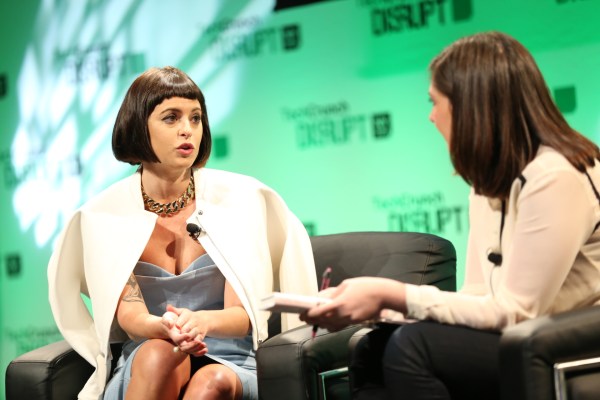Motivational stories are banal, personal anecdotes of people you don’t know are boring, and most business books contain about one postcard’s length of wisdom, spread out over several hundred pages.
Sophia Amoruso’s recently released book #GIRLBOSS manages to avoid these pitfalls, fusing her personal life, her professional life, and a series of teachable moments together to form something quite readable. (I came across the book because Sophia Amoruso sat down with my boss Alexia Tsotsis at our TechCrunch Disrupt NY event last week, and I read the copy I received in my speaker’s bag on the flight home. You can bang through it pretty quickly.)
Amoruso didn’t start on top. Her story is a series of mishaps and adventures that led her to start an eBay store that sold vintage clothing. That store, Nasty Gal, has raised $49 million to date and now has revenues in the nine figures.
Going from struggling in school to an almost-arrest for shoplifting to running a company worth far more than $100 million isn’t a simple story. The book, aimed at youths as it is, drags in some sections when it comes to practical advice that you might have already learned. Skip the parts that don’t apply to you.
“Dream Big, Start Small”
Amoruso wasn’t a born mogul. In fact, she claims that if she knew what she does now back when Nasty Gal was busy being born, she wouldn’t have pursued the company: “I never started a business. I started an eBay store, and ended up with a business. I never would have done it had I known it was going to become this.”
Given that Amoruso appears happy, and in command of her responsibilities at Nasty Gal, her comment implies that her past self would have balked at the amount of work that would follow, and not that if she could go back and redo life, she would have not founded the company.
Lesson: You go to war with the army you have, so if you aren’t fully equipped to be the CEO of a major company today, don’t worry. You are still growing.
Pervasive in #GIRLBOSS is the concept of work. That work, instead of something that should be avoided, should be embraced. This goes for everyone.
For the young:
“A lot of people in my generation don’t seem to get that you have to work your way up. An entry level job is precisely that — entry level — which means you are not going to be running the show or getting to work on the most fun and creative projects. I’ve heard to many people in their twenties complain about their jobs because they ‘have so much more to offer,’ but first and foremost, you have to do the job that you’re there to do.”
For the more experienced:
“You want to know what four words I probably hate the most? ‘That’s not my job.’ […] In an ideal world you’d never have to do things that are below your position, but this isn’t an ideal world and it’s never going to be.”
When Nasty Gal was just starting to grow, Amoruso spent her time spamming MySpace — hey, it worked — aggressively riffing through estate sales to find new items to sell, while also handling inventory and fulfillment. She was a one-person company. But, “What part did luck play in her success?” is a fair question.
Luck
Was all that success luck? Fortune isn’t binary, but Amoruso’s focus on details — shipping labels that sit just right, modeling each piece, tracking what sells and what doesn’t to better tailor product mix, and so forth — was the real magic.
Her comments on the concept of luck take the cliche that “luck is when preparation meets opportunity” a bit further:
“I hate the concept of luck, especially when people try to apply it to me. Yes, it’s true: Hundreds of thousands of businesses fail. Mine succeeded. Was that all just because I ‘got lucky’? I don’t think so.
What I hate about luck is that it implies being devoid of responsibility. It implies that you can do nothing and then step into success as easily as stepping into a pile of dog poop on the sidewalk. […] Luck lets us believe that whatever happens, whether good or bad, it’s not to our credit or our fault. That is why I don’t buy luck.
Framing that, the most successful CEOs that I know, or know of, tend to be exhausted and harried and not precisely the jovial-yes-we’re-killing-it types that so often end up on magazine covers. Amoruso’s current status is predicated on years of sweat and unglamorous labor.
Embracing Yourself
It’s always tricky to talk down about yourself once you pass a certain level of success — can you manage to not sound humblebraggish? Amoruso mostly pulls it off.
The core arc of the personal component of #GIRLBOSS is watching the younger Amoruso fall down again and again, with increasing magnitude, until she essentially decides to shape up after the shoplifting expedition that ends with her watching her “outlaw lifestyle fade quickly into the distance.”
Amoruso still didn’t particularly want to fit in (“Being from the suburbs, I’d always equated comfort with ennui…”), but she jarred her life onto a track that had Nasty Gal at the far end.
So, it turns out that smearing poop on the wall, piercings, low grades, hitchhiking and bumming around with hippies*, working a stream of dead-end jobs, and committing serial theft do not make you unfit for a life of doing well for yourself, and yes, if you are into that sort of thing, the company you found.
Life isn’t easy, and business is harder. But regardless of where you are today, you can advance your career or build something that may or may not fail. Cheer up, that’s good news.
Here’s Amoruso’s recent chat with TechCrunch:
*I’m from Corvallis. I note ‘hippies’ in that context with love.
